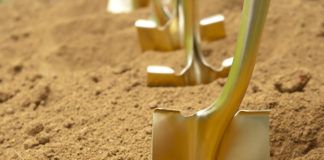Paul Danos took a bit of a winding path to his role as CEO of Danos in Gray, Louisiana. That’s because his father and uncle had created some very specific rules to follow should he or his brothers, representing the third generation, choose to work for the company.
Rule No. 1? “We had to work somewhere else first,” Danos says.
So in the years following his graduation from LSU, he worked for Arthur Andersen in Houston, then later for a pipeline company. While there, he gained some valuable exposure to the energy industry.
After earning his MBA at Stanford University in 2005, he returned to Danos as a project manager in the construction division. “I then had to abide by another rule: I could only hold a job that I was qualified to fill,” he adds. “It couldn’t be some ‘made up’ position.”
He worked his way up from there, serving as executive vice president from 2010 to 2017, then co-CEO over strategic planning, business development and the production operations service line from 2017 to 2020.
Today, Danos leads the vision and strategy development and provides leadership to the other executives, who in turn lead strategy and operational execution.
Apart from work, he serves as the chairman of the National Oceanic Industries Association, and recently served as president and board member of the South Central Industrial Association.
Have you come to appreciate those rules?
I learned the value of hard work. I worked part-time in school shoveling horse manure, working in our Leeville fabrication shop, doing pipeline work in Fourchon, and working on a lift boat in Venezuela. I came to appreciate what our people do in the field. Those manhours are executed by some wonderful people. Having a personal relationship with them and understanding the value of what they do … I can’t underestimate the value of that.
Having that appreciation helps me make better decisions. I realize the impact that every decision will have on the front-line crews. And when people know that part of our story—that we weren’t just handed a job in the company—it gives us some credibility and an ability to connect with our workers.
What’s most challenging about your current position?
Running a business is not just about numbers and profit. It’s about the people. We have 2,500 employees and most of them have a family to support. Having grown up in this business, I know a lot of them personally. I feel a sense of weight and responsibility because of that. When the market collapsed in 2020, I made a point every day to find someone that we had to lay off and just talk to them. That way it stayed real and personal.
Preparing for the future of oil and gas is another challenge. We’re bullish in oil and gas because we know the world will still need it for decades to come, but we’re also excited about the transition to renewables. We’re looking into solar and opportunities for wind and doing work around coastal restoration.
Still, we believe that there are opportunities to continue providing low-cost, clean energy from fossil fuels for a long time. A focus on technology that will allow us to do it in a low-carbon way.
What do you find most rewarding?
We’re in the people business. It’s part of who we are. What’s most rewarding to me is when I have an opportunity to engage with everyone, from the management team down to the front line folks.
I can’t tell you how often I hear people thank us for operating a family-owned, private business in a way that encourages growth and professionalism. We’re 76 years old, and there’s never been a time in our history when we’ve been more committed to being a family-run business.
But it’s also a challenge. Family businesses are great when they’re run correctly. Otherwise, they can be extremely dysfunctional.

What are your biggest concerns?
I’m concerned about the current administration’s view of oil and gas. There’s no quick flipping of a switch that will move us from oil and gas to renewables in a way that is affordable and reasonable, and that will meet our energy needs. Putting pressure on our industry and overregulating it in an attempt to get us to move too fast is going to create a catastrophe.
We need to agree to a transition that is smooth, feasible and paced correctly.
Passions outside of work?
My faith and my church are important to me. I also have four daughters, so my girls and my family are a huge part of my life. Apart from that, I’ve got a few acres around my house, a tractor and some bees, so I spend a lot of my time with a chain saw in my hand or messing around with my bees. That’s what keeps me sane and grounded.









